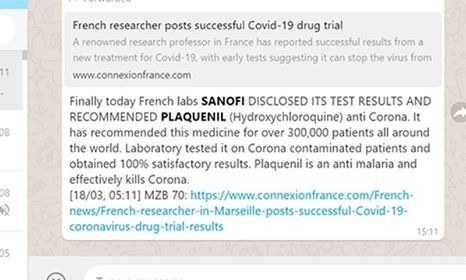Pharmacies in Pakistan's major cities of Karachi and Lahore have run out of medicines having hydroxychloroquine phosphate, also known as cholroquine, it emerged on Friday, after news began circulating on social media that the drug was effective in treating patients who test positive for the novel coronavirus.
Several pharmacy chains in Karachi including Bin Hashim Pharmacy, Kausar Medicos, Nice Pharmacy and Newway Pharmacy confirmed they had run out of chloroquine drugs after a rush of customers in the past two days asking for either Plaquenil or Resochin – both of which are medicines available over the counter, include the said ingredient and are normally used to treat malaria.
“We are out of stock since yesterday,” said a sales person at Bin Hashim Pharmacy in the Federal B area of Karachi, when asked about the availability of Resochin – a drug manufactured by renowned pharma giant Bayer AG.
According to the salesman, there had been a surge in customers coming in to buy Resochin, which was being sold at Rs25 per packet (10 tablets) at the pharmacy before stocks ended. He said they were not selling Plaquenil at Bin Hashim.
A customer service employee at Kausar Medicos on Karachi's MA Jinnah road said they were out of both Resochin and Plaquenil.
In Lahore, renowned pharmacist Fazal Din and Sons were also out of stock. So was Mahmood Pharmacy in Defence Housing Authority.
Meanwhie, the Drug Regulatory Authority of Pakistan (DRAP) issued a notification on Friday evening, banning the sale of chloroquine medicines without prescription, while also directing that these be sold only by licensed pharmacies and drug stores.
The federal authority said it had received reports of hoarding of the said drugs by certain “elements”.

It also asked all pharmacies to maintain records of prescriptions of the said drugs and to note down the dosages prescribed by the physicians against which the medicines are sold.
When contacted, Sindh Health Department's media coordinator, Meeran Yousuf, said the issue of pharmacies running out of chloroquine medicines was brought to the government's notice today.
Advising against bulk buying and use of the medicine without consulting a doctor, Yousuf said there were side effects associated with the use of these drugs which could exacerbate existing health conditions in some patients.
She said the issue will be discussed during today's task force meeting of the Sindh virus response team, which is headed by Chief Minister Murad Ali Shah.
Does it really work?
The success of hydroxychloroquine in treating patients with the novel coronavirus is not completely unfounded. Recent studies have shown two drugs, remdesivir and chloroquine phosphate, efficiently inhibited the coronavirus in an experimental setting.
An article published on Feb 4, 2020 in the Cell Journal – a prestigious international journal in life sciences with a current Impact Factor of 17.848 – confirmed that both remdesivir and chloroquine had some success in treating the novel virus.
The research did emphasise that an overdose of chloroquine can cause acute poisoning and death.
A recent article, published on March 12 in the The Chinese Journal of Tuberculosis and Respiratory Diseases found that treating patients diagnosed as having the novel coronavirus pneumonia with chloroquine “might improve the success rate of treatment, shorten hospital stay and improve patient outcome”.
Read: Chloroquine and coronavirus — what is the connection?
After these findings, a group of researchers of the Department of Science and Technology in China's Guangdong Province in consultation with the province's health commission developed “expert consensus in recommending chloroquine phosphate tablet, 500mg twice per day for 10 days for patients diagnosed as mild, moderate and severe cases of novel coronavirus pneumonia”.
Meanwhile, the University of Minnesota said on March 17 it was launching a clinical trial to test hydroxychloroquine as a “post-exposure treatment for coronavirus Covid-19 disease” because “recent work shows that hydroxychloroquine is active in a laboratory setting against” the novel coronavirus.
The trial is designed to see if it translates into benefits for people, the university said.
On Thursday, United States President Donald Trump said the country is fast-tracking the drug for treating coronavirus.
During a White House press conference, Trump said: "[Chloroquine or hydroxychloroquine] has shown very encouraging early results [...] and we're going to be able to make that drug available almost immediately."
‘Buy it now, people don’t know yet’
Umar, a resident of Karachi's Defence area, rushed to the nearest pharmacy around midnight on Thursday, hoping to get his hands on Plaquenil.
He said a close friend had forwarded him a message on WhatsApp, which said the anti-malarial medicine Plaquenil “effectively kills” coronavirus. “He [the friend] then called me and said ‘buy it now; people don’t know yet’,” Umar said.
But he was was disappointed when two pharmacies sent him back. They were out of stock.
“No one knew about Plaquenil till a couple of days ago,” a salesperson at a pharmacy in DHA's Seher Commercial area told him. “But so many have come to buy it in the last two days that we are out.”

Several reliable studies have noted that in the past years, due to infrequent utilisation of chloroquine in clinical practice, its production and market supply was greatly reduced in many countries, particularly in China. At least one pharmacy in Karachi's DHA said the medicine in question, Plaquenil, was low in supply for many years.















































